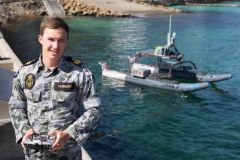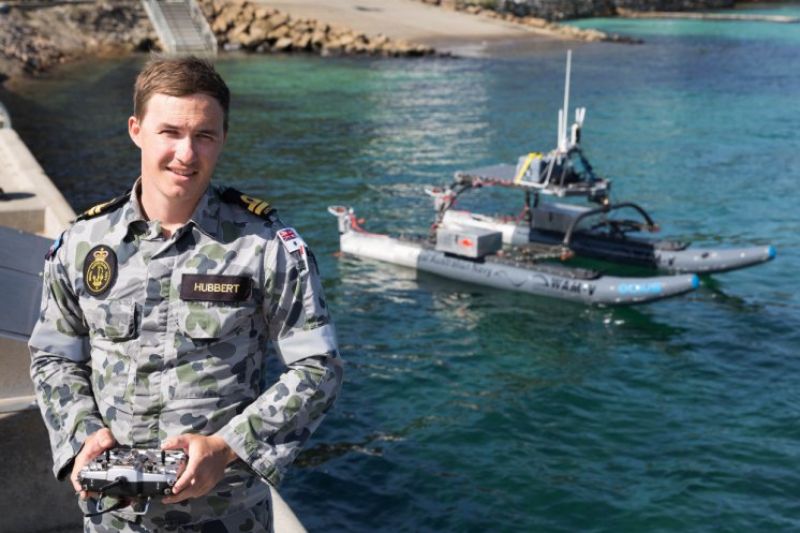
Former Australian Maritime College student Harry Hubbert has paid tribute to AMC after he was recognised as one of Australia’s most innovative engineers for 2019.
Royal Australian Navy Lieutenant Harry Hubbert was awarded by Engineers Australia for developing a robotic, unmanned surface vessel, dubbed WAM-V ( Wave Adaptive Modular vessel) at low cost using second hand sensors and equipment.
Lieutenant Hubbert, 27, developed new custom machine learning software and artificial algorithms which enabled WAM-V to perform exceptionally well in Exercise Autonomous Warrior on Jervis Bay in November 2018.
In collaboration with other assets above and below the surface WAM-V was able to detect other vessels around it, avoid collisions and scan the horizon for gunnery firings.
Lieutenant Hubbert originally from Airlie Beach in Queensland was a founder of the AMC’s Autonomous Technology Society (AMCAT) when he studied at the Newnham campus from 2010 to 2014.
He graduated with a Bachelor of Naval Architecture with Honours in 2014.
“At AMC I became interested in programming automation in my first year when I did an introduction to programming course as part of the engineering degree,” he said.
“In my second and third years I started doing some work outside my classes with Dr Alex Forrest and then we started up the AMCAT Society which builds unmanned boats for competitions.
“We built an unmanned boat so that gave me the first taste of unmanned systems which is what my award is based on.
“I learnt the engineering fundamentals at AMC and also used the foundation knowledge of hydrodynamics on how things move through the water, so that knowledge helped with programming the robot so I could predict how its going to behave.
Lieutenant Hubbert said he had always wanted to go to AMC after being inspired to do Naval Architecture by working in his father’s aluminium boat building business.
“I really liked the idea of drawing ships and designing things and engineering and the only place that really does that is AMC,” he said.
In early 2019 Lieutenant Hubbert trained for six weeks at AMC Search learning to operate small vessels used to launch and recover AUV’s.
He said the Navy had encouraged his innovative work with digital technology.
He served as second engineer on HMAS Adelaide before returning to his current base on HMAS Waterhen in Sydney where he works on the capability implementation team for Navy’s Autonomous Systems.
AMC Principal Michael van Balen said:”It is great to see an AMC alumnus doing so well and clearly enjoying his time in Navy; an organisation I hold near and dear to my heart.
“I wish him well in his career and ongoing success in his engineering developments.”
The Engineers Australia award was for “development of advanced Maritime Autonomous Systems outside their typical duties or expected capability”.
The success of WAM-V was all the more meritorious because it was pitted against more expensive and sophisticated vessels from major defence and technology companies.
“I am extremely honoured to be selected to receive this award. I am passionate about improving the Navy and advancing our maritime autonomous systems,” Lieutenant Hubbert said.
“I would like to thank my superiors within the Mine Warfare and Clearance Diving Group, Directorate of Navy Continuous Innovation and Project Jericho who have supported my work outside of my typical duties and aided in me being able to work on my extra-curricular projects,” he said.
The collaborative project brought together contributions from Navy, Ocius Technology, Thales, Flinders University and the Defence Science and Technology Group.
Australia’s Most Innovative Engineers is an annual program run by Engineers Australia’s Create magazine to recognise 30 of Australia’s most innovative engineers across 10 categories from a cross-section of the profession.
Now in its fourth year, the listing celebrates engineering innovation and showcases the important role engineers play in solving some of the world’s biggest challenges.
Awards applicants were asked to explain what their project was, the problem it solved, the benefits it offered, why it was innovative and the role they played individually.
Source: Navy Daily
Published on: 10 Jul 2019
